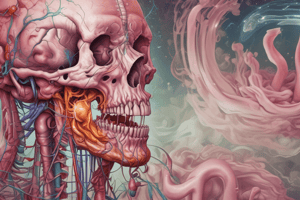Podcast
Questions and Answers
What is a bacterial cause of splenic enlargement?
What is a bacterial cause of splenic enlargement?
- Mononucleosis
- Thalassemia
- Endocarditis (correct)
- Rheumatoid arthritis
What is a common symptom of splenic enlargement?
What is a common symptom of splenic enlargement?
- Left upper quadrant abdominal pain (correct)
- Fever
- Headache
- Nausea
What is a laboratory test used to diagnose splenic enlargement?
What is a laboratory test used to diagnose splenic enlargement?
- Electrocardiogram (ECG)
- Complete blood count (CBC) (correct)
- Electroencephalogram (EEG)
- Liver function tests (LFTs)
What is a type of cancer that can cause splenic enlargement?
What is a type of cancer that can cause splenic enlargement?
What is a complication of splenic enlargement in liver disease?
What is a complication of splenic enlargement in liver disease?
What is a physical examination method used to diagnose splenic enlargement?
What is a physical examination method used to diagnose splenic enlargement?
What is a parasitic cause of splenic enlargement?
What is a parasitic cause of splenic enlargement?
What is a type of imaging study used to diagnose splenic enlargement?
What is a type of imaging study used to diagnose splenic enlargement?
What is a hematologic disorder that can cause splenic enlargement?
What is a hematologic disorder that can cause splenic enlargement?
What is a liver disease that is often associated with splenic enlargement?
What is a liver disease that is often associated with splenic enlargement?
Flashcards are hidden until you start studying
Study Notes
Causes of Splenic Enlargement
- Infections:
- Bacterial: endocarditis, sepsis, and abscesses
- Viral: mononucleosis, cytomegalovirus, and hepatitis
- Parasitic: malaria, leishmaniasis, and schistosomiasis
- Hematologic disorders:
- Hereditary spherocytosis
- Thalassemia
- Sickle cell disease
- Inflammatory disorders:
- Rheumatoid arthritis
- Lupus
- Sarcoidosis
- Cancer:
- Lymphoma (Hodgkin's and non-Hodgkin's)
- Leukemia
- Metastatic cancer
- Other causes:
- Portal hypertension
- Cirrhosis
- Sickle cell disease
Symptoms of Splenic Enlargement
- Asymptomatic in many cases
- Left upper quadrant abdominal pain or discomfort
- Early satiety
- Fatigue
- Weakness
- Anemia
- Easy bruising or bleeding
- Splenomegaly (enlarged spleen) may be palpable on physical examination
Diagnosis of Splenic Enlargement
- Physical examination:
- Palpation of the spleen
- Percussion to assess size
- Imaging studies:
- Computed tomography (CT) scan
- Magnetic resonance imaging (MRI)
- Ultrasound
- Laboratory tests:
- Complete blood count (CBC) to evaluate anemia and thrombocytopenia
- Blood smears to evaluate for abnormal red blood cells
- Liver function tests (LFTs) to evaluate for liver dysfunction
Relation to Liver Disease
- Splenic enlargement is often associated with liver disease, particularly:
- Portal hypertension
- Cirrhosis
- Liver cancer
- The spleen may become enlarged due to:
- Portal hypertension causing increased blood flow to the spleen
- Increased production of cytokines and growth factors in liver disease
- Infiltration of the spleen by liver cancer cells
- Splenic enlargement may also contribute to liver disease by:
- Sequestering platelets and red blood cells, leading to thrombocytopenia and anemia
- Impairing liver function by increasing portosystemic shunting
Causes of Splenic Enlargement
- Infections can cause splenic enlargement, including bacterial infections such as endocarditis and sepsis, viral infections like mononucleosis and hepatitis, and parasitic infections like malaria and schistosomiasis
- Hematologic disorders can also cause splenic enlargement, including hereditary spherocytosis, thalassemia, and sickle cell disease
- Inflammatory disorders like rheumatoid arthritis, lupus, and sarcoidosis are also associated with splenic enlargement
- Cancer, including lymphoma, leukemia, and metastatic cancer, can cause splenic enlargement
- Other causes of splenic enlargement include portal hypertension, cirrhosis, and sickle cell disease
Symptoms of Splenic Enlargement
- Many cases of splenic enlargement are asymptomatic
- Left upper quadrant abdominal pain or discomfort is a common symptom
- Early satiety, fatigue, weakness, anemia, easy bruising or bleeding are also common symptoms
- Splenomegaly may be palpable on physical examination
Diagnosis of Splenic Enlargement
- Physical examination involves palpation of the spleen and percussion to assess its size
- Imaging studies like CT scan, MRI, and ultrasound can help diagnose splenic enlargement
- Laboratory tests like complete blood count (CBC) and blood smears can evaluate anemia and thrombocytopenia
- Liver function tests (LFTs) can evaluate liver dysfunction
Relation to Liver Disease
- Splenic enlargement is often associated with liver disease, particularly portal hypertension, cirrhosis, and liver cancer
- Portal hypertension can cause increased blood flow to the spleen, leading to splenic enlargement
- Liver disease can also lead to increased production of cytokines and growth factors, contributing to splenic enlargement
- Splenic enlargement can worsen liver disease by sequestering platelets and red blood cells, leading to thrombocytopenia and anemia
- Splenic enlargement can also impair liver function by increasing portosystemic shunting
Studying That Suits You
Use AI to generate personalized quizzes and flashcards to suit your learning preferences.




